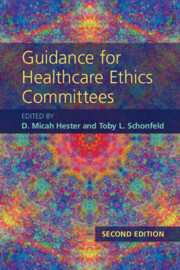Book contents
- Guidance for Healthcare Ethics Committees
- Guidance for Healthcare Ethics Committees
- Copyright page
- Dedication
- Contents
- Contributors
- Preface
- Section 1 The Context of Healthcare Ethics Committee Work
- Section 2 Consultation
- Chapter 7 Ethics Consultation Mission, Vision, Goals, and Process
- Chapter 8 A Method of Consultation
- Chapter 9 Informed Consent
- Chapter 10 Confidentiality and Privacy
- Chapter 11 Decision-Making Capacity
- Chapter 12 Discharge Challenges
- Chapter 13 Surrogate Decision Making
- Chapter 14 Advance Care Planning and End-of-Life Decision-Making
- Chapter 15 Potentially Inappropriate Treatment and Medical Futility
- Chapter 16 Cognitive Dissonance and the Care of Patients with Disorders of Consciousness
- Chapter 17 Ethical Issues in Reproduction
- Chapter 18 Ethical Issues in Neonatology
- Chapter 19 Ethical Issues in Pediatrics
- Chapter 20 Neuroethics
- Chapter 21 Ethical Issues in Clinical Genetics
- Chapter 22 Challenging Issues in Surgical Ethics
- Chapter 23 Psychiatric Ethics
- Section 3 Policy Development and Organizational Issues
- Index
- References
Chapter 20 - Neuroethics
from Section 2 - Consultation
Published online by Cambridge University Press: 17 February 2022
- Guidance for Healthcare Ethics Committees
- Guidance for Healthcare Ethics Committees
- Copyright page
- Dedication
- Contents
- Contributors
- Preface
- Section 1 The Context of Healthcare Ethics Committee Work
- Section 2 Consultation
- Chapter 7 Ethics Consultation Mission, Vision, Goals, and Process
- Chapter 8 A Method of Consultation
- Chapter 9 Informed Consent
- Chapter 10 Confidentiality and Privacy
- Chapter 11 Decision-Making Capacity
- Chapter 12 Discharge Challenges
- Chapter 13 Surrogate Decision Making
- Chapter 14 Advance Care Planning and End-of-Life Decision-Making
- Chapter 15 Potentially Inappropriate Treatment and Medical Futility
- Chapter 16 Cognitive Dissonance and the Care of Patients with Disorders of Consciousness
- Chapter 17 Ethical Issues in Reproduction
- Chapter 18 Ethical Issues in Neonatology
- Chapter 19 Ethical Issues in Pediatrics
- Chapter 20 Neuroethics
- Chapter 21 Ethical Issues in Clinical Genetics
- Chapter 22 Challenging Issues in Surgical Ethics
- Chapter 23 Psychiatric Ethics
- Section 3 Policy Development and Organizational Issues
- Index
- References
Summary
As defined by Judy Illes and Stephanie Bird (2006, 511), “neuroethics is concerned with ethical, legal and social implications of neuroscience research findings, and with the nature of the research itself.” Subsequent to this definition, it has become clear that some of the implications of neuroscience have a direct effect on clinical care. This is especially true when focused on neuropsychiatric illnesses, which cover a broad range of conditions that are treated by psychiatry, neurology, psychology, neurosurgery, neurooncology, neuroendocrinology, and rehabilitation medicine. These areas treat chronic, acute, and congenital health conditions across the lifespan. For instance, brain malformation or perinatal strokes can occur in the youngest of patients and have sequela throughout a lifetime. Late in life, neurodegenerative diseases such as Parkinson’s or Alzheimer’s commonly arise and create many challenges for patients and families. Between these bookends we have pain disorders, epilepsies, traumatic injuries, vascular insults, and schizophrenia as further examples of the varieties of illnesses that fall under this broad rubric. These conditions all involve the brain in some way as a central processing unit and as an organizer of experiences for the individual. They also involve elements of control and experience that become altered or at risk of loss for the individual.
- Type
- Chapter
- Information
- Guidance for Healthcare Ethics Committees , pp. 175 - 182Publisher: Cambridge University PressPrint publication year: 2022



